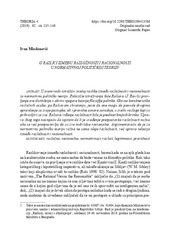Prikaz osnovnih podataka o dokumentu
O razlici između razložnosti i racionalnosti u normativnoj političkoj teoriji
On the difference between the reasonable and the rational in normative political theory
| dc.creator | Mladenović, Ivan | |
| dc.date.accessioned | 2021-10-12T12:55:44Z | |
| dc.date.available | 2021-10-12T12:55:44Z | |
| dc.date.issued | 2019 | |
| dc.identifier.issn | 0351-2274 | |
| dc.identifier.uri | http://reff.f.bg.ac.rs/handle/123456789/2746 | |
| dc.description.abstract | U ovom radu istražiću značaj razlike između razložnosti i racionalnosti za normativnu političku teoriju. Polazište istraživanja biće Rolsovo (J. Rawls) pravljenje ove distinkcije u okviru njegove kasnije filozofije politike. Glavna karakteristika razložnih osoba, po Rolsovom shvatanju, jeste da one mogu da ponude drugima opravdanje za svoje postupke, ali i pravične osnove saradnje, u svetlu razloga koji su prihvatljivi za sve. Rolsovo viđenje razložnosti bilo je predmet brojnih kritika. Upravo zbog toga nastojaću da ispitam da li je uvođenje pretpostavka razložnosti nužno ako se već pretpostavlja da su sve individue racionalne. Argumentovaću da je za normativnu političku teoriju važna ne samo ideja razložnosti, već upravo relacija između razložnosti i racionalnosti. | SR |
| dc.description.abstract | In this paper I will explore the importance of making the difference between the reasonable and the rational for normative political theory. The starting point of my analysis is Rawls's distinction between the rational and the reasonable in his later political philosophy. For Rawls one of the main characteristics of reasonable persons is that they are able to offer the justifications for their actions, but also for fair principles of cooperation, in terms of reasons that all can accept. There are many criticisms of this view of reasonable persons and its role within normative political theory. My main concern, however, is whether the presupposition of reasonableness is necessary if one already assumes that all individuals are rational. I will argue that not only the reasonable, but the relationship between the reasonable and the rational is crucially important for normative political theory. | EN |
| dc.publisher | Srpsko filozofsko društvo, Beograd | |
| dc.relation | info:eu-repo/grantAgreement/MESTD/Integrated and Interdisciplinary Research (IIR or III)/43007/RS// | |
| dc.relation | info:eu-repo/grantAgreement/MESTD/Integrated and Interdisciplinary Research (IIR or III)/41004/RS// | |
| dc.rights | openAccess | |
| dc.source | Theoria | |
| dc.subject | razložno | SR |
| dc.subject | razlozi | SR |
| dc.subject | racionalno | SR |
| dc.subject | pravičnost | SR |
| dc.subject | normativnost | SR |
| dc.subject | legitimnost | SR |
| dc.subject | reasons | EN |
| dc.subject | reasonable | EN |
| dc.subject | rational | EN |
| dc.subject | normativity | EN |
| dc.subject | legitimacy | EN |
| dc.subject | fairness | EN |
| dc.title | O razlici između razložnosti i racionalnosti u normativnoj političkoj teoriji | SR |
| dc.title | On the difference between the reasonable and the rational in normative political theory | EN |
| dc.type | article | |
| dc.rights.license | ARR | |
| dc.citation.epage | 146 | |
| dc.citation.issue | 4 | |
| dc.citation.other | 62(4): 135-146 | |
| dc.citation.rank | M24 | |
| dc.citation.spage | 135 | |
| dc.citation.volume | 62 | |
| dc.identifier.doi | 10.2298/THEO1904135M | |
| dc.identifier.fulltext | http://reff.f.bg.ac.rs/bitstream/id/1427/2743.pdf | |
| dc.type.version | publishedVersion |

